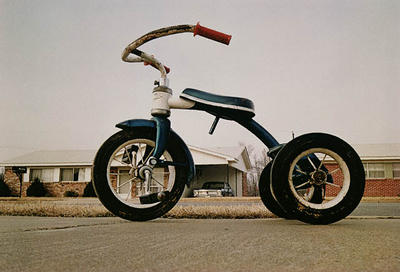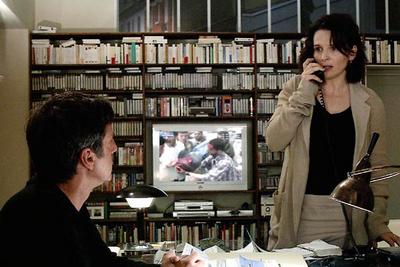

This was a fun day of festivalizing, my first film a matinee screening of William Eggleston in the Real World by Michael Almereyda. Dani and I were eagerly anticipating this one, as we share an interest in both photography and the artistic process.
Sadly, this was a poorly organized film, with grating sound and harsh visuals. It provided a meandering, foggy portrait of a very intriguing fellow. And that was the most notable, important thing about it--he was a very intriguing fellow, and now and again, you could see his particularity shine through the mess of pixellated video. These clear glimpses emerged through well timed observation, the rare question and answer, and, yes, happenstance. I felt like we learned the most about him when we got to see him at work: photographing a restaurant, exploring a house at the side of the road, presenting slides at a photography show. There are moments when he critically considers a drawing he's made, and another when he reflects upon his new work. Perhaps most telling though is a little exchange right at the end of the film.
Almereyda asks him a question, expecting a simple answer; soon he is in over his head. Something about photography capturing the ephemeral, itself becoming the artifact? No, William Eggleston wouldn't quite agree with that. His photos as things that will last? No, William Eggleston doesn't really think about that. Photography as a way of expressing feelings or point of view? No, no, not so much. Photos, like music, filling you with feeling!? No, no, Bill doesn't quite agree. Finally, they walk out to the car. He considers carefully before he says anything, and here especially you see the clear, heavy thoughts forming in his head. 'I don't think that there's a place for words in art,' he says, more or less; art is something to be accepted or rejected.
And here we find the heart of the man and his private practice of observation. This sentiment is something that I was told not long ago, funnily enough, by a friend searching for her own place in the real world. Let me offer that to you here; from Robert Henri's The Art Spirit:
"Art is simply a result of expression during right feeling. It's a result of a grip on the fundamentals of nature, the spirit of life, the constructive force, the secret of growth, a real understanding of the relative importance of things, order, balance. Any material will do. After all the object is not to make art, but to be in the wonderful state which makes art inevitable. In every human being there is the artist, an whatever his activity, he has an equal chance with any to express the result of his growth and his contact with life. I don't believe any real artist cares whether what he does is "art" or not."
"I think the real artists are too busy with just being and growing and acting (on canvas or however) like themselves to worry about the end. The end will be what it will be. The object is intense living, fulfillment; the great happiness in creation."
It has nothing to do with us, but William Eggleston seems to have certainly done that.
We exited the theatre, disappointed at the film--its implications having not yet set in for me--both lamenting the director's and subject's absence from the screening; no Q&A. As we crossed the street though, who should walk by? Well, William Eggleston and son. They crossed the street, I noted his silvery hair and slight hunch, his dark, pressed suit and deliberate gait. "There's one of the great photographers of the 20th century," I said. Dani agreed. We exchanged a few more words, I think; watched him from across the street. Soon he had left and Dani and I went our separate ways. I passed him again, down the way, now signing autographs for a couple of kids my age. I continued east for a bit and looked back. Here he was now, further away, an old man; talking, listening, looking this way and that. His party turned back. What would he take a picture of here, I wondered? How is he feeling today? What does he see? I entered the subway station thinking about this monumental / simple man; how was I feeling today? What could I see?
The PALM Pictures website.
My review for Micheal Hanake's new psychological triller Cache will be much simpler and more sensible than that above. It was an excellent film, sharp and taught as anything, fitting right into the Haneke tradition; tense and agressive, playing with complacency and the media as threats, but more than anything, showing us the damaging effects of fear and denial. This is a film full of lies and mystery, suspense and shocking reveals. Maurice Benichou plays an effective role, and Juliette Binoche is very honest in her performance as the frustrated wife. My favourite scene though has George (played by the very good Daniel Auteuil) closing the curtains to go to bed. He strips his robe and stands for a second; climbs beneath the sheets. His vulnerability is only echoed by the dark, immense cocoon of the room. I feel like this single scene describes his whole psychological state, as well, the brooding tone of the film.
In the end, the film's conclusion gives it one of its biggest intellectual pushes, the film exploring the ideas of truth and responsibility to cloudy, disturbing ends. Winner of The Prix de la mise en scene, or Best Director Award at the Cannes Film Festival.

No comments:
Post a Comment